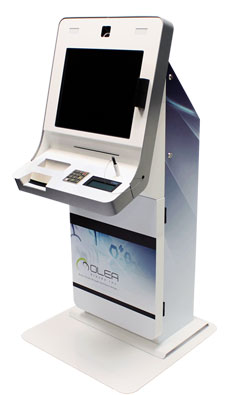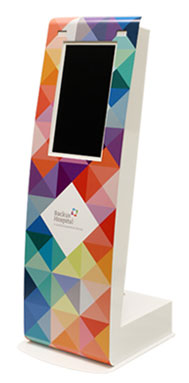The new generation of kiosk technology has the power to disrupt our healthcare landscape in a good way, especially at a time when the effects of the Affordable Care Act are already being felt by patients and healthcare providers alike. Although there are challenges still to be overcome, it is impossible to overlook the benefits and advantages now resulting from more widespread use of kiosks in the healthcare-services industry.
In the past, most healthcare kiosks were in the form of basic, digital blood-pressure monitors installed in drug stores and supermarkets. Yet, today's technology can do far more, including measuring height and weight, checking vision, and even connecting users with live healthcare professionals for more in-depth diagnostic processes. Kiosks can question patients about their symptoms and help assess current conditions, and all these functions can be performed at lower costs than traditional medical examinations.

Kiosks are engaging, versatile and far-reaching
Most importantly, Internet-enabled kiosks can engage people and draw them into longer-term relationships in ways that standalone digital equipment cannot, by serving individuals who are undiagnosed, or perhaps not yet ill enough to receive more-costly treatments at home. And, when deployed in healthcare facilities, retail stores or public locations, kiosks can guide users with pinpoint precision for both wayfinding and product-selection purposes.
As well, kiosks excel in home-monitoring environments where elderly or under-compliant patients may have trouble taking action. For example, when monitoring diabetes or blood pressure, kiosks can direct patients step-by-step to complete a home diagnostic process, or connect them directly through internet video when they need assistance. Indeed, kiosks are quite effective for improving patient outcomes and reducing healthcare expenditures, whether at home or in a public setting.
Pinpoint marketing
From a business perspective, healthcare kiosks offer plenty of new avenues for increasing revenue. Empowered by kiosks, companies enjoy more opportunities to market products and services directly to their captive audiences, assuming that such advertising is both well-targeted and appropriate for healthcare needs. Traditional, broad-media healthcare advertising uses a "shotgun" approach in an attempt to reach those who suffer from ailments which often affect only a small percentage of the population, and results are rarely quantifiable. Yet, kiosks allow marketers to address the precise needs of specific patients, even while checking their vital signs and monitoring their health conditions.
The myths
Still, there are obstacles to be overcome through education: One of the common misperceptions about healthcare kiosks is that they lead to less face-to-face time between patients and healthcare professionals. As with other unfounded worries, this confusion results from not fully understanding the power of well-applied technology to connect people rather than separate them. Most people would agree that advancing technologies in general have greatly enhanced medical care while saving lives and improving quality-of-life for patients. As such, kiosks blend together the best technologies for helping people.

Beyond the cost savings realized when providers streamline interactions between healthcare workers and patients, most kiosk-users report a better experience overall, since kiosks enable patients to receive diagnostic information and interact with providers on their own terms, and on their own time schedules. When the workload is managed with the help of kiosks, busy healthcare professionals are able to spend more time with the sickest patients, or those who require the most personal attention.
Another easily-debunked myth regarding kiosks is that users spend too much time entering information into the system. Yet, the reality is quite different. Unlike handwritten systems or personal interviews, a well-designed and deployed kiosk system saves a considerable amount of time for both patients and staff alike, by speeding and streamlining the large volumes of data needed for best care. And, with the HIPAA-compliant interfaces now available in healthcare kiosks, concerns about personal data security are largely resolved.
Skepticism turns into enthusiasm
Internet-connected kiosks also help protect patients from medication and treatment errors, as well as offering opportunities for medical follow ups, and even marketing, all of which have the effect of reducing healthcare costs and improving patient outcomes. As with any well-proven technology being newly applied to healthcare, the earlier skepticism about kiosks is now being replaced with wholehearted enthusiasm by an increasing number of healthcare professionals, patients, and providers.